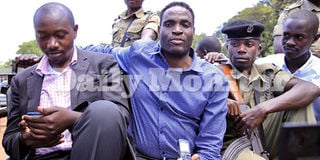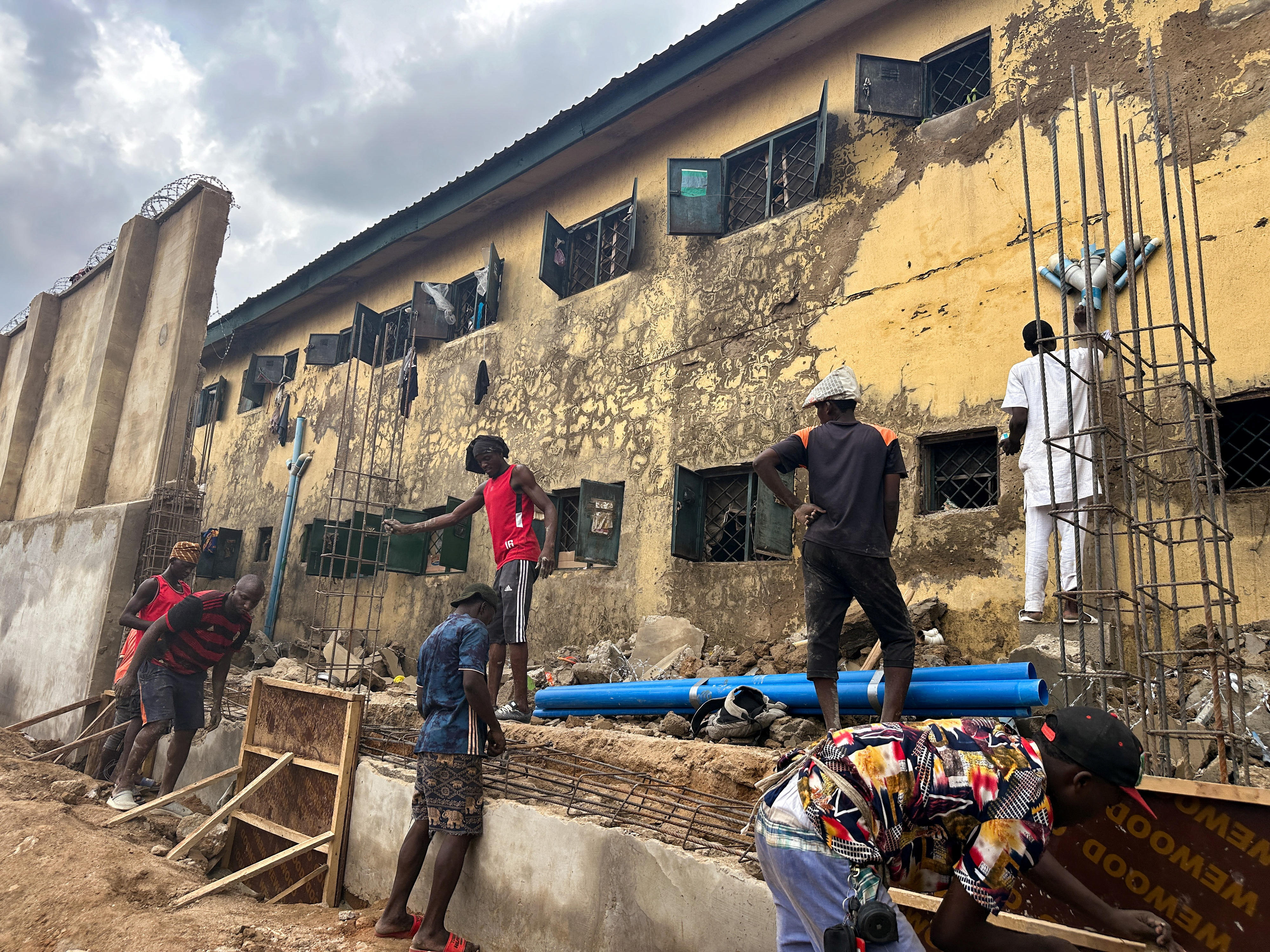Covid-19: How lockdown has hampered access to justice

Arrested. Pastor Augustine Yiga (centre) of Revival Church, Kawaala in Rubaga Division after appearing at Mwanga II court on March 30, 2020. PHOTO BY DAVID LUBOWA.
What you need to know:
- Lockdown. Courts should not have opened at all but once they open, they must give chance to both parties because there is no preferential treatment to one side under Article 23 of the Constitution.
As President Museveni extended the lockdown for another 21 days to curb on the spread of the deadly Covid-19 virus, access to justice is one area that has been affected and will continue being affected.
This has culminated into the prison population immensely increasing by 2000 inmates in the last one month.
This is mainly attributed to the failure by many judicial officers to hear out the bail applications for newly charged accused persons with the top officials in the Office of the Prime Minister (OPM), being the latest culprits.
On Tuesday this week, presiding magistrate Olga Karungi, after hearing the prosecution side in the OPM food scam case, closed out the defense lawyers who had stood to apply for bail for their clients, citing Covid-19 pandemic.
The affected OPM officials are; Ms Christine Guwatudde Kintu, Mr Joel Wanjala (Under Secretary and accounting officer), Mr Martin Owor, the head of the Covid-19 food relief procurement and also the commissioner disaster preparedness, Mr Fred Lutimba, the Assistant Commissioner in charge of procurement.
The four were arraigned in court and denied charges of allegedly colluding to commit a fraudulent practice in regard to inflating prices of COVID-19 food relief.
Likewise, earlier this month, Pastor Augustine Yiga of Revival Church, Kawaala in Rubaga Division, saw the decision on his bail, deferred twice because his followers had thronged the courtroom, a move that flouted one of the Covid-19 preventive measures of social distancing.
His bail ruling is set to be delivered today at Mwanga II court.
Also on Tuesday this week, High Court judge, Wilson Kwesiga declined to grant bail to presidential aspirant, Lt. Gen Henry Tumukunde, citing among other reasons, the disabling circumstances created by the ongoing lockdown due to Covid-19.
The judge observed that disabling circumstances created by the lockdown, had slowed down the work of the investigators and yet it would be prudent to release Gen Tumukunde after the investigations are complete.
“I am conscious that the development of this case coincided with the nation-wide lockdown that affected actions of both parties (prosecution and defence lawyers). In view of these disabling circumstances, the solution is to accommodate both parties for protection of the state evidence yet to be collected,” Justice Kwesiga observed
“The solution is not to reject releasing the applicant (Gen Tumukunde) on bail but to delay the release for reasonable time due to the prevailing natural precautions that stopped movement of persons to prevent possible regrettable health occurance,” he added.
One of the defence lawyers of the remanded OPM suspects, Mr Fred Muwema, argued that if it is Covid-19 reason, courts should not have opened at all but once they open, they must give chance to both parties because there is no preferential treatment to one side under Article 23 of the Constitution.
He explained that the mere fact that court can seat during the pandemic to hear plea of the accused persons, it means the court had weighed the situation and found it could seat and hear the pleas.
“The court having constituted itself to hear one party (prosecution), it could not at the same time say it could not hear another party in the same proceeding. In doing so, court is infringing on the right to be heard. The court which is supposed to enforce the right is instead infringing on people’s rights,” lamented Mr Muwema.
He continued: “The right to be heard is one of the non-derogable rights that cannot be taken away because it encompasses the right to access to courts of law and to be heard.”
Mr Muwema who is also engaged in a power generation case in West Nile which has not been fixed due to the ongoing lockdown, suggests that it would have been better for courts to hear those matters which are urgent.
In his letter dated April 4 to Dr Ruhakana Rugunda, the chairperson of the national task force on Covid-19, counsel Muwema argued that the people of West Nile will suffer power outages if the matter between his client Electromaxx Vs Absa bank is not heard urgently given the current lockdown.
“Because of the uncertainty, we worry that hearing of our client’s urgent case may forestall. If this happens, it will mean that our client shall not in this critical time, have a chance to present it’s plea to court for access of funds to enable it generate and supply electricity to the West Nile region,” the lawyer wrote Dr Ruhakana Rugunda.
“Consequently, the affected region will inevitably descend into acute power outage on immediate basis. This will undoubtedly compromise both public health and national security.” He added.
Counsel Muwema also noted that since the state of emergency hasnt been officially declared, people’s constitutional rights should be respected.
Likewise, Dr Sylvia Namubiru, the executive director of the Legal Aid Servise Providers Network (Laspnet), argued that government should have allowed a few lawyers mainly the human rights defenders, to continue working in this lockdown period.
Legal representation was not among the essential servises recently listed by President Museveni to be allowed on the road with a sticker and work during this lockdown period.
“The constitution demands for a fair hearing. There are rights that are non-derogable like fair hearing which should under no circumstances be waived. We understand the prevailing Covid-19 circumstances call for intervention by government but human rights should be observed and it’s the lawyers who represent those whose rights have been abused and yet we can’t be allowed to move,” Dr Namubiru argued.
“We now have a situation were the police and other security officers are enforcing the lockdown directives, the Judiciary is partly allowed to work and remand these suspects but the servises of lawyers are considered non-essential and yet we need to represent these people.” She added.
Dr Namubiru revealed that the law society has proposed to the Judiciary about the need to use a “Zoom application” technology that will enable lawyers represent their clients online without physically coming to court since they don’t have stickers for essential workers to facilitate their movement.
Weighing in, the president of Uganda Law Society (ULS), Mr Simon Peter Kinobe said though he commends the measures put in place by government to curb the spread of global pandemic, there are challenges with enforcement especially about their legal representation.
“Therefore, in order to avoid congestion of our prison system and unnecessary spread of diseases, it imperative that the rule of law is strictly adhered to both by government and private citizens,” said Mr Kinobe. Adding: “A bail application does not take 10 minutes to dispose it of so there is no justification to postpone a bail hearing. Again we have also seen some judicial officers abusing the discretion granted by law by setting unprecedented unrequired conditions yet it should be exercised judiciously and not arbitrarily.”
PRISON
Mr Frank Baine, the spokesperson of the Uganda Prisons said that the current situation has increased congestion which has forced the institution to make adjustments where women inmates have been transferred from Kigo to allow new entrants. “The numbers have affected our plans to catch up with the recommended international recommendations on the ratio of inmates to the staff,” said Mr Baine.




